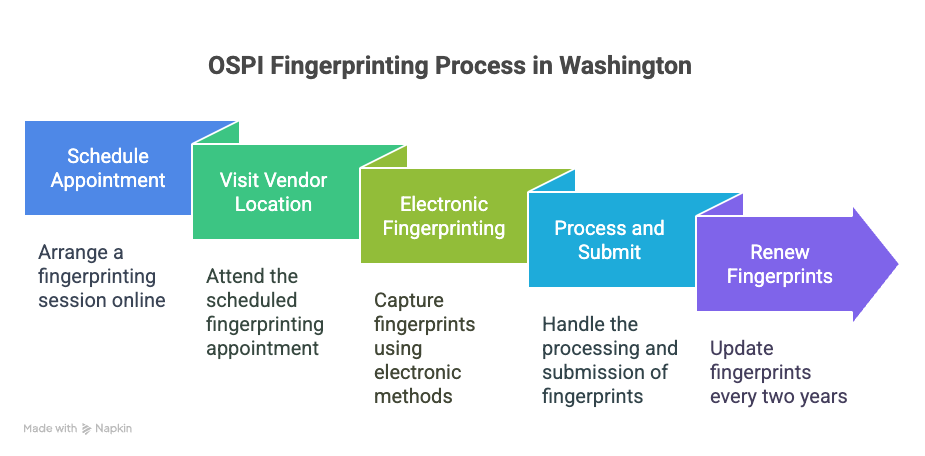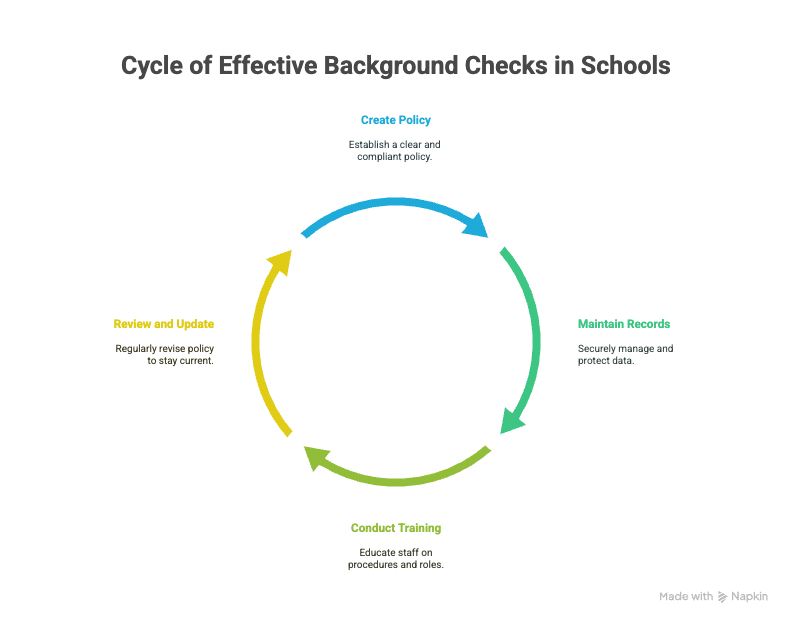Welcome to our extensive guide on background checks within Washington's education sector. Whether you're a staff member, volunteer, or policy administrator, understanding the nuances of these checks is crucial for maintaining a safe and compliant school environment. In this article, we delve into the requirements set by the Office of Superintendent of Public Instruction (OSPI) and provide actionable insights for everyone involved.
Key Takeaways
- Background checks in schools are essential for ensuring the safety and trustworthiness of individuals interacting with students.
- The process in Washington is governed by the Office of Superintendent of Public Instruction (OSPI), which mandates criminal history checks and supports school safety through its guidelines.
- Fingerprinting is a crucial part of these checks, with costs typically ranging from $50 to $75, and is usually required for those who regularly interact with students.
- School volunteer screening involves background checks, reference checks, and interviews to evaluate a volunteer's suitability before they start their role.
- Schools must maintain comprehensive background check policies and ensure transparency, providing individuals with the opportunity to correct or dispute inaccurate findings.
Introduction
Background checks are the bedrock of trust and safety in schools. They're not just about checking a box; they're about ensuring that the people who interact with students are trustworthy. By implementing rigorous checks, schools create an environment where education thrives and safety is prioritized.
This guide outlines the school background check process in Washington, focusing on requirements from the Office of Superintendent of Public Instruction (OSPI). It offers key insights and best practices for staff, volunteers, and policy administrators to help ensure a safe educational environment.
Understanding Washington School Background Checks
Washington school background checks are thorough examinations designed to ensure the safety of students and staff within educational institutions. These checks typically involve criminal history reviews and may include fingerprinting, all aimed at verifying the suitability of individuals working or volunteering in schools.
The Office of Superintendent of Public Instruction (OSPI) is the key organization overseeing these background check requirements. Its role involves setting the standards and procedures that schools must follow. The OSPI ensures that each candidate, whether they are a new staff member or volunteer, meets the criteria for maintaining a secure and conducive learning environment.
Washington state laws and regulations are essential for conducting background checks. The Revised Code of Washington (RCW) and the Washington Administrative Code (WAC) provide detailed guidance on the required check processes for school employees and volunteers. For instance, RCW 28A.400.303 mandates background checks for certificated school employees, while RCW 28A.400.305 outlines the procedures for non-certificated staff and volunteers. This highlights the comprehensive nature of these background checks.
Are you familiar with your school district's specific practices for implementing these checks? Itâs crucial to stay updated on any changes in the regulations and ensure consistent compliance. Understanding the legal framework surrounding these checks not only promotes safety but also upholds the integrity of educational institutions.
OSPI Fingerprinting WA: Key Requirements and Processes
Fingerprinting is a crucial part of the background check process for school employees and volunteers in Washington. It isn't just about ticking boxes; it's about creating a safe environment for students. The Office of Superintendent of Public Instruction (OSPI) mandates fingerprinting to verify the identity and criminal history of those involved in educational settings.
The fingerprinting process starts with scheduling an appointment with an approved fingerprinting vendor. Most often, you can handle this online through OSPI's portal. You'll visit a designated location where your prints are taken electronically. This method is preferred for its accuracy and speed.

Not everyone needs to be fingerprinted. Typically, it applies to those directly involved with students, like teachers, administrators, and volunteers spending significant time in schools. Even contractors who regularly interact with students might need to go through this.
Fingerprinting isn't free. Expect costs around $50 to $75, covering the processing and submission. Schools or districts may cover these fees, but it's best to confirm beforehand. Fingerprints need renewing every two years, ensuring records stay updated with any changes in a person's criminal history.
Regular fingerprinting might seem tedious, but it helps keep schools secure. Would you trust someone working with your child without a thorough background check? Following these requirements ensures a safer space for everyone involved.
School Volunteer Screening
School volunteer screening is a critical step in ensuring the safety of students. Volunteers often engage directly with children, so securing trustworthy individuals is pivotal. The screening process involves several methods, each designed to evaluate a volunteer's suitability.
Common practices include conducting criminal background checks, reference checks, and interviews. Criminal checks will show past convictions or pending charges, helping schools identify potential risks. Contacting references can provide insight into a volunteer's reliability and character, while interviews offer a chance to assess their motivations and communication skills.
To comply with OSPI requirements, volunteers should undergo these screenings before starting their roles. Schools often require volunteers to fill out a form that gathers personal information necessary for the checks. Staying organized and transparent in maintaining these records is crucial for meeting compliance.
Challenges can arise, such as delays in background check results or difficulties in verifying information. To tackle these issues, schools should have a streamlined process and clear communication channels. Setting expectations with volunteers about timelines and requirements can mitigate frustration and ensure a smooth experience.
Addressing these aspects thoroughly ensures that only qualified individuals are granted access to volunteer roles, ultimately fostering a safe and supportive school environment.
Best Practices for Implementing Background Checks in Schools
Creating a policy sets the foundation for successful background checks in schools. Start with a clear outline of what is required by law and any additional checks your district may choose to implement. Collaborate with legal counsel to ensure compliance with state and federal regulations. Make the policy easy to understand and accessible to everyone involved. Regularly review and update it to reflect any legal changes or district needs.
Record keeping and privacy come next. Maintaining detailed and organized records of completed checks is crucial, but so is respecting privacy rights. Use secure systems to store and manage this information, ensuring access is limited to authorized personnel only. Inform staff and volunteers about how their data will be used and protected. This transparency fosters trust and reduces concerns about data misuse.
Training and awareness are equally important. Educate those involved in the hiring and volunteer selection process about the policies and procedures in place. Host workshops or training sessions to ensure everyone understands their roles and responsibilities. Encourage questions to clarify any uncertainties. Empower your staff and volunteers with the knowledge they need to remain compliant and uphold the legal and ethical standards expected in an educational setting.

Effective implementation of these practices ensures a safer environment for students, staff, and volunteers. By streamlining your background check processes, you reinforce security and trust in the educational community.
Legal Considerations and Rights
Under Washington law, you have specific rights regarding background checks. The law requires transparency, which means you have the right to know if a check will be conducted and what information it will seek. Have you ever considered what protections are in place for you? Washington law safeguards your privacy and ensures accuracy in these checks, allowing you to correct or challenge any errors that may arise.
The Equal Employment Opportunity Commission (EEOC) provides additional protection. Although not state-specific, its guidelines prevent discrimination in the background check process. Schools must ensure checks don't unfairly target specific groups. Does your school comply with these federal standards?
Encountering potentially negative findings in a background check doesn't automatically disqualify someone. Schools must follow a consistent process for evaluating such information. If something adverse comes up, you're allowed to explain or dispute it. Have you considered what policies your school has in handling these findings? Open discussions between schools and individuals help in making informed decisions.
Further Reading
To deepen your understanding of background checks and ensure compliance, explore additional resources. Our blog provides more articles on background checks and compliance, offering practical insights and updates on industry trends. For a comprehensive toolkit on conducting background investigations, consider visiting SHRM's toolkit. This resource is invaluable for anyone involved in hiring and managing staff. Expanding your knowledge through these resources can enhance your practices in the field of education.
Conclusion
Adhering to OSPI requirements for background checks is essential for maintaining a secure educational environment. These checks aren't just formalities; they're necessary tools to protect children and staff. Staying informed about the latest protocols can make a significant difference in implementing effective safety measures. Background checks build trust and ensure a consistently secure atmosphere for all involved in the school system. As you navigate these processes, remember the impact they have on creating a safe and supportive educational environment.
Frequently Asked Questions (FAQs)
What disqualifies you from working in WA schools?
Felony convictions, crimes against children, and certain misdemeanors can disqualify you from employment.
How long do WA school checks take?
Background checks usually take 2-3 weeks.
Are substitute teachers fingerprinted in Washington?
Yes, substitute teachers must be fingerprinted.
Can a DUI affect school employment in WA?
Yes, a DUI can impact your eligibility, depending on circumstances and timing.
How to appeal a denied school clearance in WA?
You can request a review by contacting the Office of Superintendent of Public Instruction.
Do private schools follow OSPI rules?
Not always. Private schools may set their own standards but often follow similar guidelines.
Are expunged records visible to WA schools?
No, expunged records are not visible during background checks.
Whatâs the cost of school fingerprinting in WA?
Fingerprinting costs approximately $45.
Do volunteers need checks in WA schools?
Yes, volunteers must undergo background checks.
How often must school employees renew checks?
School employees typically renew background checks every two years.
Are school bus drivers subject to background checks in WA?
Yes, school bus drivers must pass background checks and complete training.
Can non-teaching staff work without a background check in WA schools?
No, all staff members, including non-teaching staff, require a background check.
What happens if a background check reveals a past conviction?
The school district will review the conviction details to assess suitability for employment.
Is there a difference in the process for charter schools?
Charter schools follow the same state requirements for background checks as public schools.
Definitions
Background Check
A background check reviews a personâs past activities to verify identity and assess any risks. For school employment or volunteer roles, this often includes criminal history, employment verification, and references. It helps schools determine if a person is suitable to work with students. Washington law requires checks for all employees and most volunteers before they begin.
Fingerprinting
Fingerprinting is used to confirm someoneâs identity and check their criminal record. In Washington schools, staff and volunteers often provide fingerprints as part of the hiring or onboarding process. These prints are sent to state and federal databases. Results usually return within two weeks. Schools may require updated prints every two years.
Volunteer Screening
Volunteer screening is the process schools use to check if someone is fit to work around students. It often includes criminal background checks, reference calls, and sometimes interviews. Screenings help ensure volunteers are responsible and safe. Applicants may need to fill out forms and provide personal information for verification.
OSPI (Office of Superintendent of Public Instruction)
OSPI oversees public education in Washington State. It sets rules for who can work or volunteer in schools. This includes managing background check and fingerprinting standards. OSPI ensures school districts follow laws that protect students and maintain a secure learning environment.
Compliance
Compliance means following the rules set by laws, agencies, or organizations. In school hiring, it refers to meeting background check and privacy requirements. Staying compliant helps schools avoid legal issues and ensures student safety. Regular review of policies helps everyone stay aligned with current standards.

GCheck Editorial Team
Meet the GCheck Editorial Team, your trusted source for insightful and up-to-date information in the world of employment background checks. Committed to delivering the latest trends, best practices, and industry insights, our team is dedicated to keeping you informed.
With a passion for ensuring accuracy, compliance, and efficiency in background screening, we are your go-to experts in the field. Stay tuned for our comprehensive articles, guides, and analysis, designed to empower businesses and individuals with the knowledge they need to make informed decisions.
At GCheck, we're here to guide you through the complexities of background checks, every step of the way.





